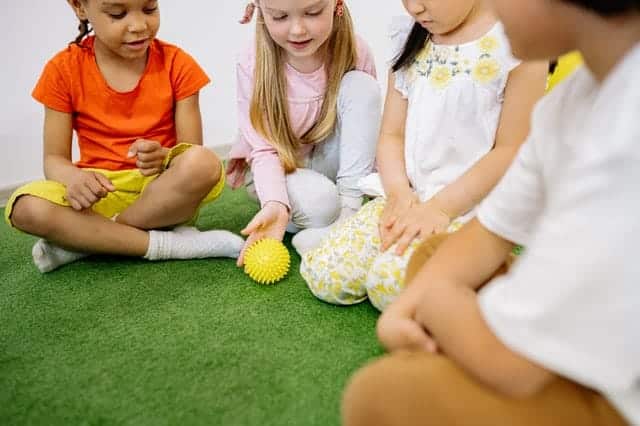Building social skills helps children develop strong friendships, and encourages better peer and adult relationships. Read about social skills activities for kids and how they can help children improve their interactions.
Social Skills Activities for Kids
Social skills are a critical part of child emotional development. With attention, children begin building social skills from birth to age three. Then these skills are enhanced throughout childhood. However, students of any age can improve their social skills and benefit from them. Social skills are developed with both effort and practice.
What Are Social Skills?
Social skills are the tools necessary for children to form and maintain relationships. These skills help children self-regulate and take responsibility for their actions. According to 8,000 teachers and 20 years of research, here are the top 10 most important skills:
- Listen to others
- Follow the steps
- Follow the rules
- Ignore distractions
- Ask for help
- Take turns when you talk
- Get along with others
- Stay calm with others
- Be responsible for your own behavior
- Do nice things for others
When children are able to listen to others and take turns they improve their communication skills. That interchange is important for positive relationships with others. Likewise, following the rules, ignoring distractions, and being responsible for behavior show self-control. Additionally, getting along with others and staying calm are important skills for cooperation. Asking for help and following directions show independence. Lastly, doing nice things for others signifies empathy. Social success is intertwined by many other skills. However, these are the core social skills that will benefit children for a lifetime.
Benefits of Learning Social Skills

Social skills are incredibly important for many reasons. Researchers found that when these skills are taught, problem behaviors are reduced and learning time is maximized (Vanderbilt).
Long-term benefits are also noted. For example, schools with strong social emotional programs have higher graduation rates. This translates to better employment opportunities and wages, as well as improved physical and mental health (PBIS).
Learning social skills is just as important as learning academics. In fact, it is a precursor to any kind of learning. Students who learn social skills learn communication and are better at conflict resolution. They learn how to advocate for themselves, and implement emotional management tools. Other benefits include:
- Reduced rates of bullying
- Improved school climate and a culture of inclusion
- Increased self-awareness
- Better active listening skills
- Ability to set and achieve goals
- Enhanced ability to communicate with peers and adults
- Cooperative teamwork
- Improved school safety
- Decreased probability of health problems
- Development of persistence
- Lower likelihood of substance abuse (PBIS)
In contrast, when students do not learn social skills, they can suffer from loneliness and mental health problems. They tend to have poor relationships with others. Similarly, students who have inferior social skills may have school and behavioral problems (Behavioral Sciences). Other issues include difficulty completing academic work. Therefore, students are far more likely to thrive at school when taught social skills.
Social Skills Activities for Kids

There are many fun and engaging ways to teach children social skills. Here is a list of social skills activities, and how to implement them.
-
Turn-Taking Games
One example is throwing a ball and naming the student you are passing it to. Another idea is playing a board game and having students say, “My turn,” at the start of their turn.
-
Role-Playing
Practice scenarios where children do not know anyone. Start by discussing phrases they can say. Some of them could include, “My name is…” and “Can I play with you?” (Child Development)
-
Making Friendship Cards
First, discuss friendships and what makes a good friend. Then have students write a card to a friend. (PBIS)
-
Playing “Simon Says”
This game helps with attention skills and self-regulation. In this game, one person at the front must say an action, such as “raise your hand.” However, if they do not say, “Simon Says,” then the children who perform the action are out. Every action must be said like this: “Simon Says: ___ “.
-
Playing “Red Light, Green Light”
In this game, students must work on self-regulation and following directions. This game is best played outside. The teacher or a student must stand at the finish line, and everyone else has to stand at the starting line. When the announcer says, “Green Light!” students can walk or run towards the finish line. However, when the announcer says, “Red light!” students must stop at once. Any students moving after that command are out.
-
Seeing Something From Someone Else’s Perspective
Gather children in a circle and tell students it’s important to see things from another’s perspective. Then demonstrate how to do this. Say something like, “I noticed that (the student) was having a difficult day when their friend wasn’t in class. I thought it must have been sad for them to miss their friend.” Model both their perspective and how you think they felt. (Child Mind Institute)
-
Discussing Social Norms by Watching a Clip or a Short Show Together
Before starting the show, discuss that the children will be watching for characters and the setting. Ask what they know about the show or characters. Additionally, ask what they expect to happen in the scene. After discussions begin watching but keep the remote handy. Pause the video at important parts and discuss character actions. You can also point out body language or facial expressions (Child Mind Institute).
-
Playing Board Games
Before starting, discuss appropriate ways to win and lose. Also, discuss appropriate commentary. Comments such as, “That was a great move!” and “Great game!” are encouraged. Then have students play with each other, and positively reinforce self-regulation and social skills (Child Development).
-
Having Students Work with Mentors
This can be done with peers or different age groups. Students should work on pro-social activities, such as reading together, working on projects, art, or more.
-
Having Students Create Videos
Children can learn new skills with imitation. Practicing these techniques in the classroom is a safe way to learn them. First, discuss the primary social skill, such as self-regulation. Explore what it means, and the body language and words associated with it. Next, group children in small groups (3-6) and encourage them to act out a scene showing cooperation. Then create the video. Lastly, share the video and discuss the body language and skills shown. This can be done with younger students if the teacher or a volunteer video records for them (Positive Action).
There are many ways to teach social skills to children. This is not an exhaustive list. Please see below for additional resources.
Soul Shoppe provides social emotional learning programs to enhance children’s social skills. Soul Shoppe programs help schools and parents teach mindfulness, inclusivity, allyship, conflict resolution strategies for students, and more.
You May Also Like:
Virtual Social Learning Activities
Embodiment Practices for Kids In School or at Home
Building Emotional Resilience in Kids
Sources:
Behavioral Sciences, Childhood Development, Child Mind Institute, PBISRewards, Positive Action, Scholastic, Vanderbilt, Education, Parenting Science, PBS, Positive Action, Positive Psychology


